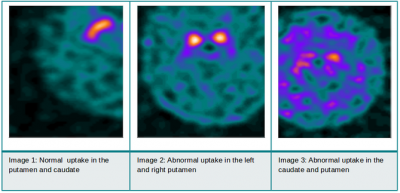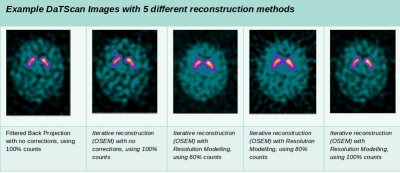Imaging of movement disorders, primarily with 123I-FP-CIT (DaTSCANTM) SPECT is key research area within the department.
The
noise handling effects of iterative reconstruction with
resolution-modelling has been successfully used as a strategy to
reduce scan duration in Bone and Myocardial Perfusion SPECT. Work is
currently underway to assess different studies that can utilise these
reconstruction techniques to reduce scan time. 123I-FP-CIT
(DaTScan) is a cocaine analogue that binds to dopamine transporters
and reduced uptake in the putamen indicates early IPD (Idiopathic
Parkinson's Disease).

Current scan times for this study are 45 minutes long, using the resolution-modelling reconstruction technique has the potential to reduce these scan times, improving image quality and patient experience. 123I-FP-CIT (DaTSCAN) SPECT images were reconstructed with different reconstruction methods and reduced counts to assess how resolution-modelling affects the interpretation of the images.

We continue to work with Movement Disorder specialists within UCL supporting projects including the monitoring of possible disease modifying drugs for Parkinson's disease, and testing the efficacy of new techniques to identify people with a high risk for Parkinson's disease. Our collaborations with EARLs ENCDAT initiatives also continue, both in the support of research into factors that may affect 123I-FP-CIT binding, and in the acquisition and reconstruction methodologies that can be used effectively with the normal healthy database that ENCDAT holds.
 Close
Close

